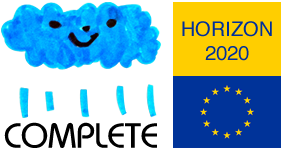
The COMPLETE summer school on Small-Scale Turbulence in Clouds was hosted by Max Planck Institute for Dynamics and Self-Organzation in Göttingen. MPIDS is engaged in a variety of dynamical and in particular self-organizational phenomena: from vortices in turbulent flows, neural networks in the brain, to granular matter and complex fluids. Although these systems can be assigned to different disciplines, they often follow similar laws and can thus be studied and described using similar methods.
Here is an interesting video of the values and mission of the Max Planck society: https://www.youtube.com/embed/zZFyD8kSaIo?feature=player_embedded&autoplay=1&showinfo=0&rel=0&autohide=1&color=white&fbclid=IwAR3pbrqspfNahqYiBJv6EESeDGnFmM7P6pg6i70qqgPn71Xwo-GwNKwU3bQ
Let us show you some insights from the school:
Greetings from our ESR5, Guus Bertens, and the beginning of the school

Michael Wilczek began his first lecture in saying "Turbulence is a universal phenomenon in all fluids, all aroud the planet".


Haitao Xu explaining Lagrangian statistics of turbulence








Lab tour was one of the most interesting parts of our summer school at the Max Planck Institute for Dynamics and Self-Organzation in Göttingen. Here, Mohsen Bagheri shows our ESRs the components of the instrument set carried by a helikite.







Johannes Guettler had a chance to show us his setup for observing the settling of tiny, 3d-printed particles.





One of the most amazing setups in the Laboratory for Fluid Physics, Pattern Formation and Biocomplexity at the Max Planck Institute for Dynamics and Self-Organization in Göttingen is this special chamber equipped with multiple sensors for cloud particle and turbulence experiments.





Getting right inside the Max Planck Institute for Dynamics and Self-Organization aerodynamic tunnel during our summer school lab tour.






Networking






During our summer school, ESRs Antonio and Johannes from Max Planck Society, gave their collegues a little flavour of practical 3d printing.





Extreme events and intermittency in fine-scale turbulence were subjects of John Lawson's (Department of Fluid Dynamics, University of Southampton) talk during the summer school in Gottingen.








Greg A. Voth (Wesleyan University, http://gvoth.research.wesleyan.edu) talking about non-spherical particles in turbulent conditions.












During the summer school, Greg Bewley (Cornell University) told us the story of the Goettingen active grid.






In situ measurements of cloud microphysical properties - this most exciting subject was the main focus of Oliver Schlenczek's (Max Planck Institute for Dynamics and Self-Organzation in Göttingen).






Prof. Bernhard Mehlig (University of Gothenburg) gave us a thorough course on Statistical models for particles in turbulence during the summer school.







Jörg Schumacher (Ilmenau University of Technology) told us lots of interesting facts on numerical studies of cloud turbulence from mesoscale moist convection to cloud microphysics during the summer school.






